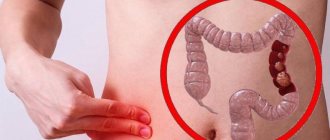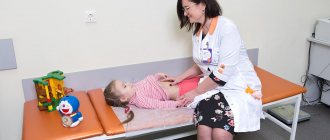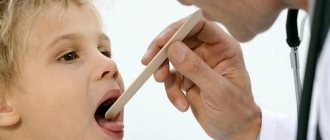Vomiting is a forced, uncontrolled expulsion of stomach contents
or intestines through the mouth with the participation of the abdominal muscles and diaphragm. Vomiting is also accompanied by weakness, drooling, watery eyes and dizziness. Both the feeling of nausea and vomiting are triggered by a special nerve center located in the brain stem. The signals come from sensitive receptors in the digestive tract, so irritation of these receptors triggers the gag reflex. Irritation of the sensitive receptors of the gag reflex occurs, for example, with strong stretching of the walls of the stomach, with eating foods with an irritating effect, with inflammation of the walls of the stomach and intestines (gastritis, gastroenteritis). Direct irritation of the “vomiting center” can also cause vomiting, even if there is no irritation from the digestive tract. This phenomenon is observed in various diseases of the nervous system.
What is vomiting? The reasons for its occurrence
A healthy child will not vomit!
Vomiting occurs in the following cases:
- Poisoning.
- An inflammatory process in the stomach caused by infection.
- Diseases of the pancreas, liver, gastrointestinal tract.
- Increased intracranial pressure due to birth trauma.
Vomiting can occur in both adults and small children. She doesn't just appear. There are always reasons, and this is a serious cause for concern. Especially if the child is vomiting.
What should parents do?
If a child begins to have attacks of vomiting mixed with bile, while the body temperature rises, there is bloating and pain, it is necessary to urgently call a doctor or an ambulance. Any of your actions can aggravate the already difficult situation of the child.
First aid
Before the ambulance arrives, try to position the child so that he cannot choke on vomit. Place pillows under his back so that his head is much higher than his body. Give him something to drink: even if it makes him vomit after a while, it will flush his stomach. This is important if a child is poisoned by poor-quality food. It is advisable to give the child enterosorbents that will absorb bitterness, bile and toxins that poison the gastrointestinal tract.
The first thing parents should do is calm the baby. To do this, they themselves need to pull themselves together and not show fear or panic. After clearing the baby of vomit, try to soberly assess the situation:
- Examine the baby's tummy: is there any bloating?
- Ask your child, if he can speak, whether his stomach hurts, whether he feels sick or not.
- If there is no swelling and the temperature does not rise, then poisoning may be occurring. First aid for poisoning is to give the baby a 1% saline solution, which will induce vomiting. Then give an enterosorbent, which will help the digestive tract cleanse itself of pathogenic microflora and toxins, cover the intestines with a protective film, and absorb gases, preventing bloating and flatulence.
- You can very carefully palpate the baby's tummy, observing his reaction. Based on where the grimace of pain appears, you can judge what caused the problem. The right hypochondrium is the gallbladder or liver, the iliac region is the stomach or pancreas. The left or right side is slightly lower - colon diverticulosis is possible. Then you need to urgently call an ambulance.
Should I call a doctor?
If the vomiting was one-time, and gastric lavage and taking enterosorbent had their effect, then there is no need to call a doctor. The condition of the child will show you this. But there are cases, which have already been mentioned above, when calling a doctor, and sometimes an ambulance, is necessary:
- Vomiting of bile in a child with fever does not stop; each intake of liquid causes a new attack.
- A high temperature has risen (above 38.5°C) and does not fall.
- The baby's belly is swollen and painful, causing crying.
- Vomiting bile is accompanied by diarrhea and high fever. There is nothing to think about; you need to urgently call a doctor or an ambulance.
In these cases, you should immediately consult a doctor.
Drug therapy
If a child is vomiting bile, then without diagnosis it is better to refrain from unauthorized “prescribing” of medications.
The most common cause of gallbladder disease is the early transfer of a child to a common family table. The enzyme system in children under 7 years of age is still poorly developed, so an adult diet is not suitable for them. Also, vomiting with bile can be a harbinger of appendicitis.
But there are universal drugs:
- Rehydrants – Rehydron or Trihydrosol, which you should always have in your first aid kit. These solutions will help prevent dehydration in children and adults.
- Enterosorbents. There are several types of enterosorbents, each of which performs certain protective functions for gastrointestinal disorders. Carbon enterosorbents are the most common of them (Activated carbon, Sorbex, White carbon, etc.).
- Silicon-containing sorbents in the form of powder or paste, for example, Enterosgel, can even be given to infants by stirring them in milk. This sorbent removes endogenous and exogenous toxins from the gastrointestinal tract, formed during the life of pathogenic microflora, without affecting the beneficial intestinal microflora.
Hospital procedures
When a child vomits bile, the situation is force majeure; here you can only provide all possible first aid and wait for the local doctor or ambulance. The necessary procedures can only be performed in a hospital setting:
- Gastric lavage using a tube in case of severe poisoning.
- An enema or Esmarch mug is given to a child to cleanse the intestines in order to conduct further studies of the gastrointestinal tract.
This is where all procedures end until the reasons are clarified.
Diet recommendations
When the child’s vomiting stops, he should be fed only on demand, in small portions, avoiding the following foods:
- drinks containing caffeine;
- sparkling water and sweets;
- fatty, heavy foods.
You need to prepare light vegetarian puree soups, liquid porridges with water, rosehip decoctions as tea (can be sweetened with honey.) Then you can add fermented milk products - natural yoghurts without sweeteners with biscuits. This is how you should feed your child, gradually transferring him to his usual diet.
Surgery
If a child has adhesions, intestinal volvulus, and as a result, intestinal obstruction, then surgical treatment is indicated for him. Such treatment is carried out only if conservative methods fail. The operation is performed using two methods:
- Abdominal surgery. The abdominal cavity is opened and the twisted intestine is untwisted or part of the intestine affected by necrosis is removed.
- Laparoscopy method. A puncture is made in the peritoneum and a laparoscope is inserted - a device equipped with a television camera, a light source and surgical manipulative instruments. This is a gentle surgical method. Thanks to this method, bloodless operations are performed to remove the appendix, gall bladder, etc.
Folk remedies
If a child has had a one-time vomiting of bile, folk remedies can be given to soothe irritated mucous membranes of the digestive organs.
Recipes for infusions and decoctions of medicinal herbs:
- Infusion of chamomile and angelica. 1 tsp. Infuse herbs in a glass of boiling water for 1.5-2 hours, take 10-15 ml three times a day 30 minutes before meals.
- Brew dill seeds (1 tsp) in 200 ml of boiling water. Drink 1 tbsp. l. before eating.
- Brew rose hips in a thermos overnight. 1 tbsp per 0.5 liter of water. Give your child water between meals.
Vomiting of bile in infants
The cause of vomiting in infants is often an incorrect grasp of the breast when sucking. The baby swallows air, which causes a similar stomach reaction. Vomiting in babies on artificial nutrition is provoked by overeating when the feeding rate is incorrectly calculated. Often the feeding rate on the packaging is overestimated. Therefore, it is necessary to carry out such calculations together with your pediatrician.
But if a baby vomits like a fountain in the first 2-4 weeks, if the vomit is bilious-greenish in color and exceeds the amount eaten, if the baby’s urine is blood-red, and the stool is extremely rare, there is every reason to be wary. There are all the signs of pyloric stenosis - pathology of the gastric outlet. This outlet, connecting the stomach to the intestines, is so narrow that even the baby's liquid food is not able to pass through it.
Sometimes you can't do without hospitalization
The pathology is very life-threatening for the baby, so you should immediately contact a children's medical facility. Because this pathology can only be corrected surgically. Another, not so dangerous, but extremely unpleasant problem in infants is pylorospasm, or pyloric spasm, which can also cause frequent bouts of vomiting and regurgitation in infants, especially girls.
The cause of this pathology is the immaturity of the neuromuscular ligaments, which lead to premature relaxation of the muscle after feeding. The vomit contains food residues with bile. These babies gain weight very slowly. The only measure to prevent pylorospasm may be frequent feedings, but in reduced portions. And constant monitoring by a pediatrician and pediatric neurologist.
A child is vomiting without fever - what to do?
If your baby experiences nausea and vomiting, it is better to seek medical help. Take him to the pediatrician; in special cases you need to call an ambulance. Before the doctor arrives, the child should be given plenty of fluids to drink. Slightly warm, slightly salted or still mineral water is suitable. To calm the microflora of the digestive system, herbal decoctions, such as mint or chamomile, are excellent. The liquid will relieve the gastrointestinal tract, remove toxins and replenish water loss.
During gagging, it is recommended to monitor the position in which the child is. It is important that the body position facilitates the passage of vomit, and the baby should not choke in it. To do this, it is better to turn the child on its side and keep it in a semi-upright position. After which it is recommended to rinse the mouth and free it from vomit.
Without the instructions of a specialist, it is better not to give the baby any medications or perform gastric lavage. Only a pediatrician or attending physician can prescribe all medications. Self-medication sometimes does not contribute to recovery, but, on the contrary, directs this process in the opposite direction, causing complications. The doctor recommends all medications, taking into account the characteristics of the disease and the child’s body.
Usually, with such a diagnosis, the pediatrician refers the child to a gastroenterologist. This specialist treats pathologies of the gastrointestinal tract. He prescribes a treatment strategy, a course of medication and a diet. Even if the problem is not a pathology of the gastrointestinal tract, you still cannot do without a diet - it is required to restore the body.
Sometimes vomiting without fever is a symptom of certain diseases of the nervous system. In such cases, it is better to consult a neurologist. Sometimes this is a sign of psychosomatic illness. Then it is better to send the baby to a psychologist or psychotherapist. In this case, treatment will take a long time and will require changes in the lifestyle of the child and other family members.
You should not feed your child during vomiting attacks. It is better to wait a few hours to ensure that the indigestion process is complete. Liquid food can be given to the child no earlier than two hours after the end of vomiting.
After recovery, it is better to feed the child on a special diet. It will normalize the functioning of the digestive system and all its organs. There are no secrets - proper nutrition and maintaining water balance. The child can be given porridge made from rice, buckwheat, oatmeal, low-fat vegetable soups, baked apples, boiled vegetables, crackers, and jelly.
Vomiting of bile in young children and adolescents
Elevated temperature during vomiting is an alarming symptom
Vomiting with the presence of bile is accompanied by bitterness in the mouth. The contents are greenish in color. Occurs in the following cases:
- Abuse of fatty, fried foods;
- Disease of the gallbladder or pancreas develops;
- Gastric pathologies;
- Acute intestinal infections;
- Liver diseases;
- Appendicitis;
- Poisoning from chemicals and even alcoholic beverages.
If an infection is suspected, mothers are often given tetracycline antibiotics. But drugs from this group of antibiotics often themselves provoke nausea and vomiting. This must be known and taken into account in the process of treating a child.
Other causes of vomiting
- Myocardial infarction, arterial hypertension. With high blood pressure, vomiting is combined with a severe headache. During a heart attack, vomiting occurs simultaneously with severe chest pain.
- Diabetes mellitus in case of non-compliance with treatment regimens and diet. In this case, vomiting is combined with severe thirst and frequent urination. Severe vomiting in diabetes may be a sign of impending ketoacidosis.
- Kidney disease in the final stages (renal failure).
- Some medications may have the side effect of vomiting. If vomiting occurs during treatment with any drug, you should consult the doctor who prescribed the drug.
- Mental factors: stress, fear, anorexia, excitement, severe pain, individual unpleasant associations with any food, smell, taste, situation can also provoke nausea and vomiting. Recurrent vomiting may be a symptom of hysteria.
What to do?
Did your child vomit bile? First of all, it is necessary not to panic. If you guess the cause of vomiting and suspect poisoning, do a gastric lavage. And then give him activated charcoal. If you are sure that there could be no poisoning, then it is better to give cool boiled water with mint drops. Put the child to bed. If he has a fever, give him an antipyretic. At such moments, people usually do not want to eat.
Do not insist, let the patient’s stomach clear, do not feed for 5-6 hours. If vomiting continues frequently, give your child warm, boiled water to drink to avoid dehydration. You can also, and this is recommended by traditional healers, dilute orange juice with boiled water and give the child this drink. Do not leave your child alone, unattended while he is sick. If within 12-18 hours the little patient’s condition does not improve or begins to worsen, you should immediately consult a doctor.
Do not refuse to admit your baby to the hospital if the doctor recommends hospitalization. In a hospital setting, the correct diagnosis will be made and the doctor will prescribe treatment.
Fever, diarrhea and other associated symptoms
With a combination of fever, vomiting and diarrhea, the following can be assumed:
- The child was poisoned by stale food. Although the point here is not poisoning, but the fact that a whole colony of pathogenic bacteria has appeared in stale products. Once in the baby’s gastrointestinal tract, they suppressed the beneficial intestinal microflora and began to multiply rapidly. Hence the fever, nausea, vomiting and diarrhea. All this is accompanied by a headache. Here you cannot do without special antibiotics for the gastrointestinal tract.
- Pancreatitis will paint the same picture. But in addition there is severe pain of a girdle nature.
- An attack of cholecystitis can cause an increase in temperature to 40°C and severe pain in the right hypochondrium. Vomiting with bile in cholecystitis is an obligatory component. Diarrhea may or may not happen.
- The same picture is given by parenteral or enteral hepatitis. The first type is given to the child through a blood transfusion or injection. These are hepatitis B, C, D and G. The second type of hepatitis appears as a result of infection with viruses of groups A and E from infected water or dirty hands.
When vomiting is accompanied by diarrhea and fever, signs of dehydration may appear.
If a child vomits in the morning, this indicates overeating of fatty, spicy or fried foods consumed during dinner.
It is necessary to give the child plenty of fluids with rehydrants (for example, Regidron), which should be in every home medicine cabinet. Without them, the baby's condition will worsen every minute.
Bend of the gallbladder
A substance called bile is concentrated in the gallbladder and is actively involved in digestion, and in particular in the breakdown of fats. Bile enters the duodenum through the common bile duct, where it performs its functions.
Often the cause of vomiting with a small amount of bile is a bend in the gallbladder. This pathology has become increasingly common in children aged 6-10 years in recent years. It is often asymptomatic, but if the bend completely blocks the bile ducts, the disease can be accompanied by acute pain, loss of appetite, nausea and vomiting. If a set of such symptoms appears, you should immediately go to the hospital. The doctor will prescribe treatment and determine a diet. If a child has been diagnosed with a bent gallbladder, there is no need to panic.
As a rule, the child outgrows this pathology. The internal organs also grow and the gallbladder usually levels out. Diet is important to ensure that the gallbladder does not work with overload, does not produce more bile than it can dump into the intestines, and that stones do not form.
A child has a stomach ache and vomiting - measures to prevent such cases
There is a list of preventive measures that will help avoid the return of the disease. First of all, observe the rules of personal hygiene - wash your baby’s hands before each meal and upon returning home from the street. You should also process foods well before eating them - wash vegetables and fruits. It is important to pay attention to the quality of the dish and its shelf life. Limit your consumption of unhealthy foods - fatty, fried and fast food. Reduce your intake of sweets and baked goods.
Limit your child’s access to household chemicals and medications, and discourage putting foreign objects in his mouth - toys and household items. If a child has an attack of vomiting, it is necessary to provide him with timely treatment. The same should be done if there is pain and bloating in the abdomen, or abnormal bowel movements.
Full list of recommendations:
- Make sure your child eats on time, but does not overeat. Sometimes the body gets rid of excess food through vomiting - this is especially important in infancy.
- Take your child for preventive examinations with a specialist. This will help prevent the development of many diseases.
- If there are any abnormalities or suspicions, consult your doctor immediately. Do not self-medicate. You should not prescribe medications to your child on your own.
- Follow the rules of personal hygiene. The baby should wash his hands before eating, use a personal towel, and so on.
- Process food before eating.
- Try to wean your child from putting any foreign objects into his mouth. Make sure that he does not touch household chemicals and medications.
- Add variety to your diet. The body needs useful microelements - vitamins and minerals.
- Control what your baby eats. Products must be fresh - always look at the expiration date. Minimize your consumption of fast food, chips, packaged juices and soda.
It is always easier to prevent the occurrence of a disease than to treat it. Following these easy prevention rules will help do this.
What complications cause vomiting and diarrhea in a child?
We have already found out what to do if a child has a stomach ache and vomiting without a fever. However, if timely treatment is ignored, complications may arise.
The peculiarity of vomiting without an increase in body temperature is not a disease, but only a symptom of it. This pathology itself will not cause any complications. However, it may indicate the presence of serious diseases of the digestive system.
Such diseases can appear if treatment for the symptoms that caused the vomiting is not started in time. In many cases, the complications are quite serious, so it is better to hurry up and visit a doctor.
If vomiting continues for a long time, dehydration and weakening of the body cannot be avoided. Under the supervision of a doctor, it is necessary to give the child all the medications he prescribes. You should not self-medicate - this may not give any effect, or even lead to the opposite result.











